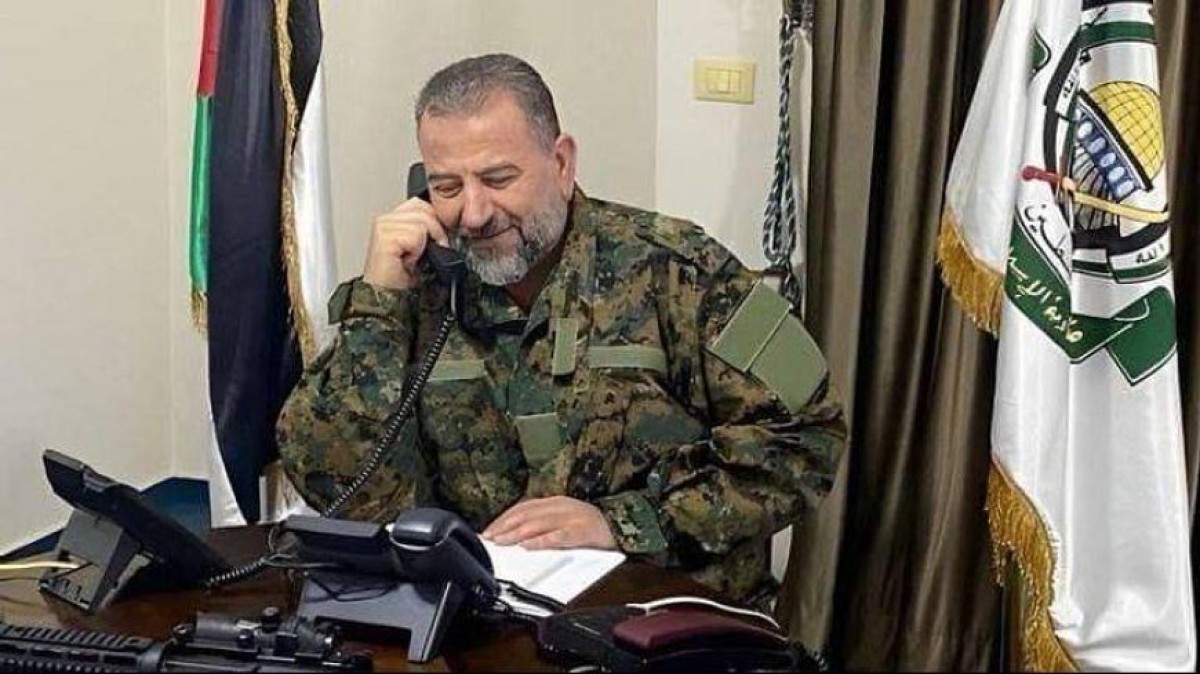 128
128
Israel on Brink: Al-Arouri's Assassination and the Consequences of Israel's Military Defeat in Gaza
Israel on Brink: Al-Arouri's Assassination and the Consequences of Israel's Military Defeat in Gaza
In the annals of Palestinian history, Saleh Muhammad Suleiman Al-Arouri's name will forever be etched as that of a great political and military commander. Born on August 19, 1966, in a village near Ramallah, Al-Arouri's remarkable journey epitomizes an unwavering commitment to the Palestinian cause. From his formative years in Palestinian schools to his graduation with a BA in Islamic Studies from Hebron University, he emerged as a key figure in the founding of the Izz ad-Din al-Qassam Brigades, the military wing of the Hamas movement. Al-Arouri's role as the mastermind behind the military competency of this resistance movement further solidified his indelible mark.
By: E. Mahdavi
Despite enduring over a decade of captivity in Israeli prisons, Al-Arouri's unwavering commitment to the Palestinian people and their struggle for freedom remained unyielding. He was released in 2007, yet it was short-lived as he was once again detained by Israeli forces. However, even from within the confines of prison, Al-Arouri continued to lead negotiations pertaining to the prisoner exchange involving the Israeli soldier Gilad Shalit. This prisoner swap agreement resulted in the release of 1027 Palestinian prisoners, including Yahya Sinwar, the current leader of Hamas in Gaza.
In the year 2021, the rise of Al-Arouri to the helm of the Hamas movement in the West Bank has served as a testament to his political acumen. However, his political endeavors, which have garnered him immense popularity among the Palestinian masses, have posed a serious challenge for the Israeli regime. In fact, Israel's intelligence and security apparatus have relentlessly attempted his assassination, perceiving him as an impediment to Israel's very existence. Tragically, on January 2, Al-Arouri was murdered in an Israeli drone attack on the Hamas movement's office in Beirut. The implications of this abhorrent crime were marked by Hamas's swift suspension of all negotiations concerning a potential ceasefire or prisoner exchange with Tel Aviv. Ismail Haniyeh, the head of the political bureau of Hamas, stated that the martyrdom of Al-Arouri and his comrades would not deter the path of resistance. He further emphasized that the resistance of the Palestinian people, who have offered tens of thousands of martyrs in Gaza, the West Bank, and South Lebanon, remains steadfast in the face of Israeli occupation.
In the aftermath of the cowardly assassination of Al-Arouri, Sayyid Hassan Nasrallah, Secretary-General of Lebanon’s Hezbollah, unequivocally asserted in his speech that the perpetrators of this heinous crime would not escape unpunished, underscoring that only the passage of time and the continued battle against the oppressor shall prove this fact. While not directly referring to Saleh al-Arouri's assassination, the Israeli army spokesman, Daniel Hagari, reiterated his regime's determination to combat Hamas, implying Tel Aviv's readiness for any scenario. This statement underscores the regime's continuing pursuit of its criminal agenda, despite the overwhelming international condemnation it has received.
In analyzing the motives behind the assassination of martyr Al-Arouri, one cannot overlook the Israeli regime's desperate attempts to compensate for its utter military failure in Gaza. However, the question arises as to why Tel Aviv would target resistance leaders outside of Palestine instead of focusing on the ongoing battle in Gaza. The answer lies in the magnitude of the fiasco suffered by Israel on October 7th, a defeat so profound that it shattered the illusion of returning to the status quo ante. Three months have elapsed since the beginning of Operation Al-Aqsa Storm, and despite the Zionist regime's claims of decimating the Palestinian resistance and wresting control of Gaza, the reality remains strikingly different. The regime's failure to achieve its objectives, including the eradication of Hamas and the release of Israeli prisoners, has dealt a severe blow to its military and political reputation worldwide. The sheer number of casualties the Israeli army has suffered so far has only served to undermine its once-vaunted image as a formidable power.
Internally, the current Israeli administration faces mounting sociopolitical tensions and a barrage of criticism from its political opposition. The debacle that unfolded on October 7th, coupled with the subsequent failures in the ongoing war against Hamas, have bolstered Benjamin Netanyahu’s opponents, who now clamor for his immediate resignation. The erosion of Netanyahu’s cabinet popularity is evident in the plummeting levels of public approval rates, harbingering the imminent downfall of his far-right coalition. In the meantime, internal schisms within the cabinet further exacerbate the predicament faced by Netanyahu.
Today, the Israeli regime's military-security apparatus finds itself in a state of profound crisis as its once formidable prestige and international standing lie shattered. Once lauded as a model of intelligence and military might, the regime's setbacks in Gaza have laid bare its underlying vulnerabilities. Moreover, the Arab nations that had sought to forge alliances with the regime for military and intelligence cooperation have grown disillusioned in the face of Israel's glaring weaknesses.
In a bid to erode the credibility of Hezbollah's warnings, Israel carried out the assassination of Al-Arouri. On the other hand, Tel Aviv perceives Lebanon's internal challenges, most importantly the prevailing economic downturn, as factors that hamper Hezbollah's ability to fully engage in the military conflict. Furthermore, by orchestrating the assassination of Al-Arouri, Israel seeks to cast doubt on Hezbollah's military strength and deterrent power.
In conclusion, the assassination of martyr Al-Arouri must be regarded as a desperate endeavor by the Zionist regime to salvage its looming collapse. The regime's failure to achieve any of its objectives in Gaza, coupled with internal tensions and the erosion of its military prestige, has led to this heinous act of terror. However, history has demonstrated that terrorism, Israel’s preferred tool, has never yielded the desired outcome. The ressitance and determination of the Palestinian people, as embodied by martyr Al-Arouri, will prevail against the Israeli occupation seeking to deny them their inalienable rights.
 128
128
Comment
Post a comment for this article